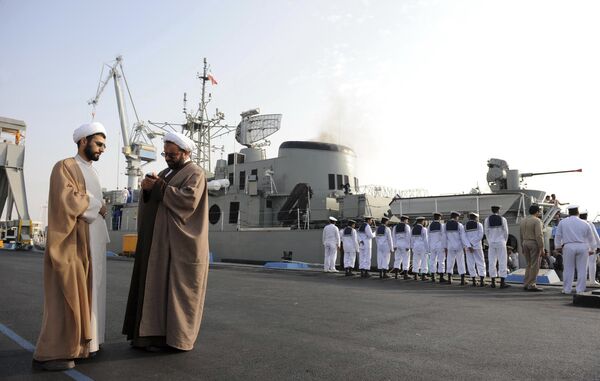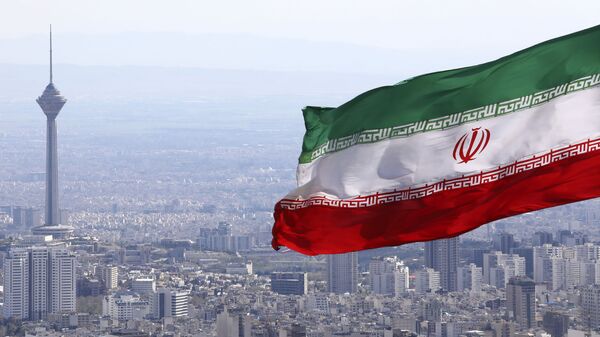Tehran has issued a warning to Washington against any manifestations of "adventurism" aimed at militarising the Persian Gulf, Iran's state news agency IRNA reported.
"We do not see the militarisation of the Persian Gulf region in the interest of any country in the region or the world", Ali Rabiei, the Iranian government spokesman, said at his weekly press conference on Tuesday.
Hope was voiced that the United States will finally give up its "extraterritorial adventurism by abandoning its policy of interfering and sowing division among the countries of the region".

When asked about the possibility of Russia, China, and Iran setting up a joint base in the Persian Gulf or the Sea of Oman, the spokesperson underscored Iran's friendly relations with the two countries.
"Our friendly relations with Russia and China are at their peak, and we have no restrictions on deepening these relations in all political and economic aspects. As we have stated many times, including during the presentation of the Hormuz peace initiative, security in the Persian Gulf region must be secured by the coastal countries of this region. This is the only way to achieve fair security for all countries and to ensure long-term peace and stability", said Ali Rabiei.
Rabiei emphasised that Tehran and Moscow share a common approach to the fight against terrorism and extremism, which has translated into joint efforts on regional issues, such as the situation in Syria.
The spokesman also hailed the fruitful cooperation between Iran and Russia at the bilateral and regional level in various fields, including the defence sector.
Rabiei also emphasised that Iran was not responsible for what is happening in Iraq, pointing out that there are groups seeking to "end the occupation in line with their national and ethnic motives".
"Their actions have nothing to do with Iran", asserted Rabiei.
The government spokesman also warned that in the event of possible provocations in Iraq, Tehran would hold the US responsible.
Show of Force in Persian Gulf
The statements by the Iranian government spokesman came after the US Navy last Monday announced that an Ohio-class nuclear-powered submarine, the USS Georgia and accompanying cruisers, had crossed the Strait of Hormuz.
JUST IN: #USNavy's #USSGeorgia transits #StraitofHormuz with cruisers #USSPortRoyal and #USSPhilippineSea. Georgia’s presence in @US5thFleet demonstrates the fleet's ability to operate wherever international law allows. #forcetobereckonedwith
— U.S. Navy (@USNavy) December 21, 2020
DETAILS ➡️ https://t.co/PObIHE2XC6 pic.twitter.com/ys8cBbnm7k
The show of force in the Persian Gulf came amid rising tensions on the eve of the first anniversary of the assassination of the head of the Islamic Revolutionary Guard Corps' (IRGC) Quds Force, Qasem Soleimani, in Iraq on 3 January 2020 by an American drone.
In what was perceived as a similar display, Israeli media reported n 21 December that an Israeli Navy submarine had crossed Egypt's Suez Canal connecting the Mediterranean to the Red Sea.
Reacting to the US Navy deployment, Secretary of Iran's Supreme National Security Council Rear Admiral Ali Shamkhani said increased military activities by the US military in the region stemmed from Washington's fear of the consequences of its past acts of mischief in this area.
US-Iran tensions flared anew after Washington designated Tehran as being responsible for a rocket attack on the American Embassy in Baghdad on 20 December. The attack left a local civilian dead, while no embassy personnel were killed or injured.
Despite Iran dismissing the US allegations that it had played a role in the rocket attack, President Donald Trump on 23 December tweeted some "friendly health advice to Iran", warning that in the event of any American deaths, he would hold Tehran responsible. He also posted a picture of three unexploded rockets allegedly found near the attack site.
Our embassy in Baghdad got hit Sunday by several rockets. Three rockets failed to launch. Guess where they were from: IRAN. Now we hear chatter of additional attacks against Americans in Iraq... pic.twitter.com/0OCL6IFp5M
— Donald J. Trump (@realDonaldTrump) December 23, 2020
US Secretary of State Mike Pompeo echoed the sentiments as he vehemently condemned the attack by "Iranian-backed militias" on the international zone in Baghdad.
Iranian Foreign Ministry spokesman Saeed Khatibzadeh at a media briefing on 28 December commented on Washington's "risky actions".
"We do not seek tensions, but responsibility for any consequences of risky actions that lead to an escalation of tensions is on the US. You certainly know that Iran will not joke with anyone when it comes to our national interests and security", said Khatibzadeh, adding that Tehran was "ready for any scenario".
"I hope that in these last days before [US President Donald Trump] leaves the White House, they will stop escalating tensions", the spokesman added.




